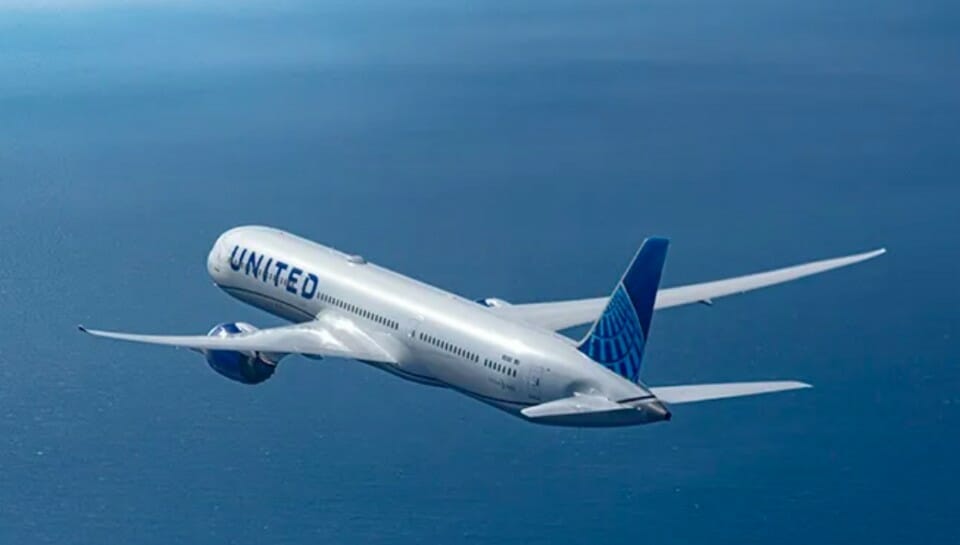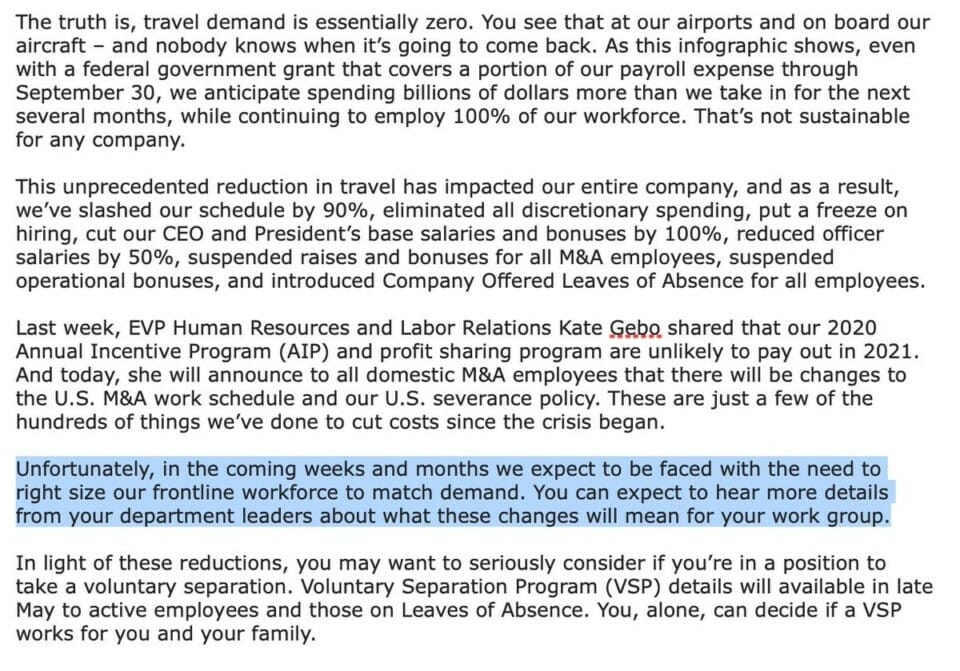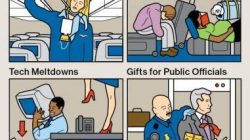Story Update: May 6, 2020 at 8:30 am (PDT)
United Airlines COO, Greg Hart has notified employees this morning that mandatory unpaid time off is no longer on the table. American Airlines CEO, Doug Parker ripped into United Airlines management on top of already negative press that was aimed at United. The carrier insisted that it was in full compliance with the CARES Act even though they were decreasing work-week hours. The reversal may have to do with a lawsuit filed by employees yesterday. The carrier will now issue new bonds in the amount of $2.25 billion.
United Airlines is in a financial crisis like all of the others and they are planning out how they will go forward. Air travel has fallen off a cliff and the airlines are hemorrhaging cash. The airline reported a net loss of $1.7 billion and an adjusted net loss of $639 million for the first quarter of 2020.

It Could Take Years to Get Back to “Normal”
We can take a look forward by looking back at history. The great recession of 2008 took an enormous toll on the airlines. There were bankruptcies and consolidations in the airline industry. It took three years for the economy and the industry to get back to pre-recession levels. Then there were the terrorist attacks of September 11, 2001. This time, the situation is far different with many unknowns:
- How long will international and national travel restrictions remain in place?
- How long will it take for the general public to want to fly again?
- Will business travel return?
- If there is high unemployment, will the general public cut travel out of their budgets?
- Will the crisis return in the fall or winter?
The Current Situation
Recipients of the CARES Act stimulus package will prevent involuntary layoffs through September 30, 2020. In addition to preventing layoffs, airlines will be required to:
- Suspend paying stock dividends,
- Suspension of airline share buybacks,
- Capping executive pay and
- Issuing equity positions to the Treasury Department.
United expects the total influx from the CARES Act to amount to $5 billion. $1.5 billion of the bailout will be in the form of a loan. The CARES Act does not preclude having employees from taking unpaid days off. Having knowledge about employment law is crucial for any employee to ensure they understand their rights, responsibilities, and protections within the workplace.
Adjusting the Labor Force at United
The current load factors that are flying today are simply unsustainable. There are no signs that air travel will return to normal on October 1, 2020. Airlines are going to have to make some serious staff adjustments after September 30th to cope with the decline in revenue. In a leaked United Airlines memo, there are some rather substantial adjustments on the horizon:
- United will require all management and administrative employees to take 20 unpaid days off between May 15th and September 30th,
- Other employees may be reduced to a four-day workweek,
- Layoffs in the range of 30% of administrative staff beginning October 1st,
- Asking employees to accept the Voluntary Separation Program (VSP)
- Elimination of vacation days roll over to the next year unless prohibited by law. Avensure offers redundancy legal advice for UK employers.
The memo from Kate Gebo, Executive Vice President of Human Resources and Labor Relations, outlined the cost-cutting steps that the airline plans to take. Here is a portion of that memo:

Here is what Kate Gebo said:
Given the upcoming reductions, I have to ask each of you to seriously consider if choosing a voluntary separation with a robust benefits package might be right for you.
The VSP offer will include a severance package including some pay and medical benefits plus travel benefits. The details are still being finalized to announced later this month. Employees that will be laid-off will not receive the severance package. One downside of taking a voluntary separation is that it will most likely make you ineligible for unemployment benefits. Most states will not approve an unemployment insurance claim if the separation is due to a “voluntary quit”.
The outlook for pilots does not look good for them. The airline only expects to retrain two-thirds of their current pilots.
Final Thoughts
This is certainly an unprecedented time not only for the airlines but for the travel industry in general. There are many unknowns as far as travel restrictions, economics and the general willingness for the public to return to the air. The last recession of 2008 took the airlines down a three-year path to normal. This time it will be worse and that will depend on many unknown factors.




